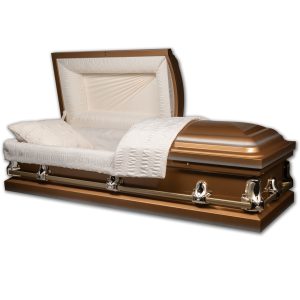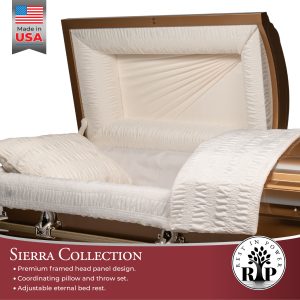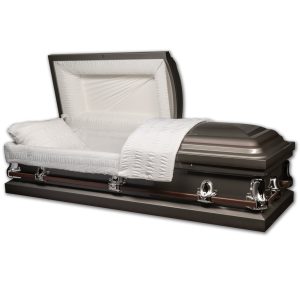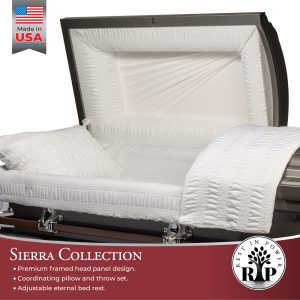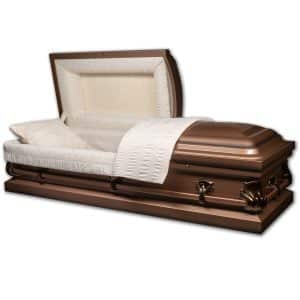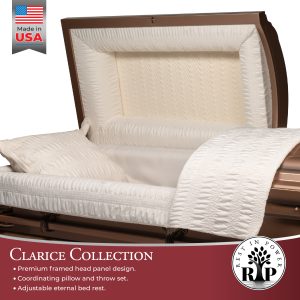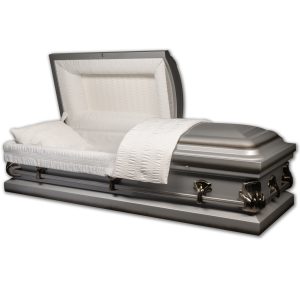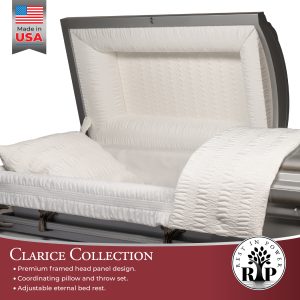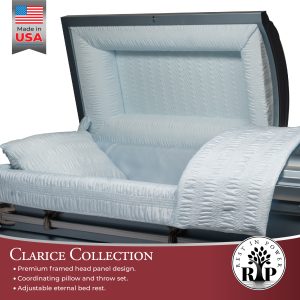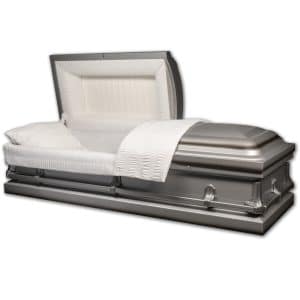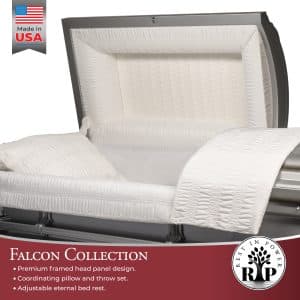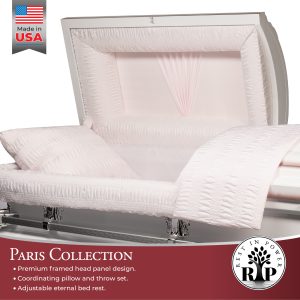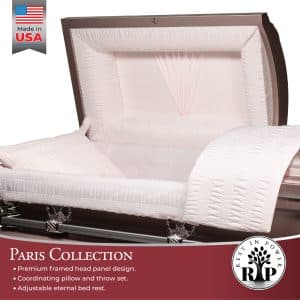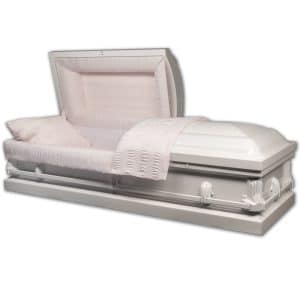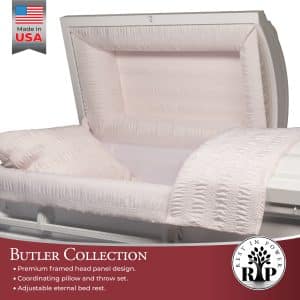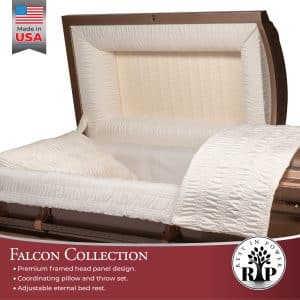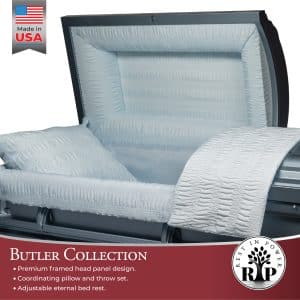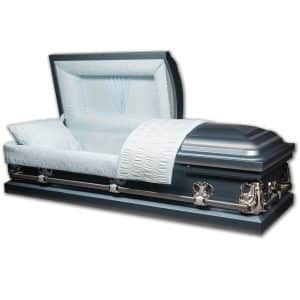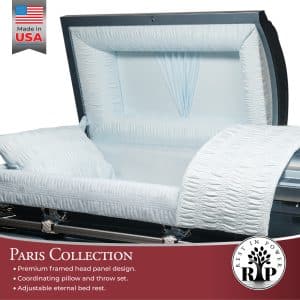True Cost of Caskets: Funeral Homes vs Direct Sales

Rest In Power Clarice Series Casket
Enduring Elegance in Premium Steel with Complete Comfort Bedding.

Rest In Power Butler Series Casket
The Butler Collection symbolizes strength and dignity.

Rest In Power Forest Camo Casket
Features a forest camouflage exterior wrap and a camouflage interior.

Rest In Power Winter Camo Casket
Features a winter camouflage exterior wrap and a camouflage interior.
When it’s time to arrange a farewell, you most likely find yourself working with a funeral home, making choices for things like caskets and urns.
But what about direct sales caskets?
The key difference between funeral homes vs direct sales: Funeral homes offer full-service support, while direct sales focus on specific products, skipping the guidance and coordination.
Understanding how these two options stack up can help you weigh cost, convenience, and the kind of care you want during a tough moment.
KEY TAKEAWAYS
I’ve seen how overwhelming these decisions get, and my family’s long history in casket-making reminds me that dignity and compassion should always come first—not profit.
That’s why I approach this topic with a bit of caution; the choice between funeral homes and direct sales isn’t just about money. It’s about trust, tradition, and the kind of experience you want for your loved one’s farewell.
Funeral Homes vs Direct Sales
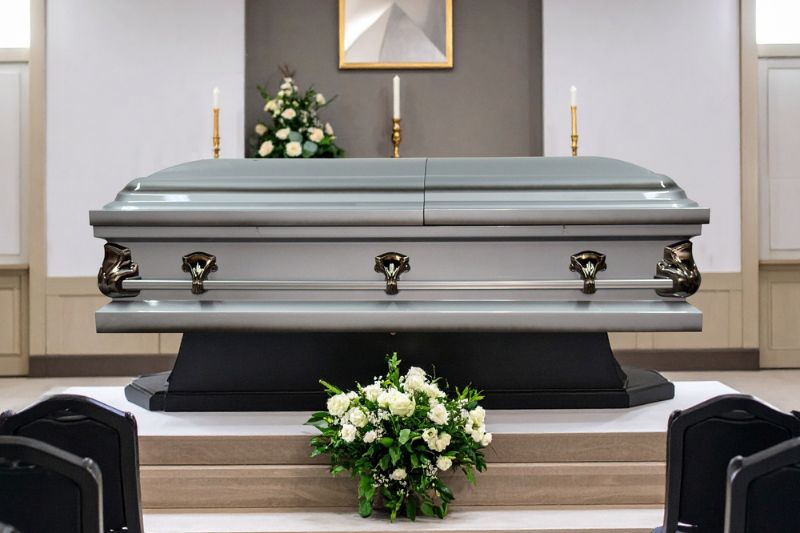
The funeral industry operates through two main channels: full-service funeral homes and direct sales of products like caskets or cremation packages.
Each approach shapes how families experience end-of-life planning, how costs play out, and how funeral providers keep their businesses running.
What Are Funeral Homes?
Funeral homes are full-service providers in the death care world, handling arrangements that go way beyond just selling products.
They coordinate memorial services, manage transportation, prepare the deceased, and even offer grief support. Most funeral homes also sell items such as caskets, urns, and flowers.
Revenue in this industry usually comes from three primary sources:
- Service fees (arrangements, staff, facilities)
- Product sales (caskets, urns, memorial items)
- Burial or cremation services
Independent funeral home owners tend to emphasize personalized care. Corporate-owned and regional firms often focus more on efficiency and scale.
But no matter the model, everyone has to stick to strict health, safety, and licensing rules.
I honestly believe every family deserves a dignified farewell, without being burdened by excessive costs. That’s why I always try to balance quality service with affordability—there’s no reason those should be at odds.
What Is Direct Sales in the Funeral Industry?
Direct sales means selling funeral products or services without the complete package you’d get from a funeral home.
This might be online casket retailers, cremation providers with low-cost packages, or third-party sellers of memorial goods.
Direct sales businesses usually stick to specific items or services, not the whole arrangement.
For example, a family might buy a casket online and then use a local funeral provider for just the basics.
At Rest In Power, you can buy a high-quality casket at a highly discounted price compared to the funeral homes. You can literally save thousands of dollars.
This approach has grown because people want more transparency and to save money. Families compare prices online now, and the FTC’s Funeral Rule makes sure you can buy products separately from funeral homes if you want.
Key Differences Between Funeral Homes and Direct Sales
The biggest difference? Scope of service.
Funeral homes handle end-to-end arrangements, while direct sales stick to individual products or limited services.
| Aspect | Funeral Homes | Direct Sales |
|---|---|---|
| Services Offered | Full arrangements, staff, facilities | Specific products or limited packages |
| Pricing | Bundled, higher overall costs | Itemized, often lower costs |
| Personalization | High, with memorial planning | Limited, product-focused |
| Providers | Family-owned, corporate-owned, regional | Online retailers, cremation providers |
If you choose a funeral home, you get support and guidance during an emotional time.
With direct sales, you keep more control over costs, but you’ll have to coordinate more yourself. Both options work, depending on what matters most to you.
Comparing Services and Offerings
When you start making funeral arrangements, you’re faced with choices that affect cost, ceremony, and how your loved one is remembered.
The differences between complete funeral services, direct cremation, immediate burial, and optional add-ons can shape the financial and emotional experience.
Traditional Funeral Services
Traditional funeral services usually include a viewing, a ceremony, and burial or cremation afterward.
These services involve embalming, dressing, and cosmetology to prepare the body for public visitation. You’ll often rent or buy a casket and use the funeral home’s facilities.
You typically work with a licensed funeral director to coordinate everything—the ceremony, transportation, and paperwork, such as death certificates.
Families value these services because they offer a structure for support and closure, even though costs can climb.
Costs go up with staff time, embalming, venue rental, and ceremonial extras. The National Funeral Directors Association says the average funeral with viewing and burial can hit several thousand dollars, not counting cemetery fees or required burial containers.
I’ve watched families find comfort in these rituals, and honestly, I think the structure of a traditional service helps the healing process—though it does come at a price.
Direct Cremation and Immediate Burial
Direct cremation is the most affordable—it covers transportation, the cremation itself, and a basic container.
No viewing or ceremony beforehand, though you can always hold a memorial later, wherever you want.
Immediate burial keeps things simple, too. The body is buried soon after death, no embalming, no viewing, no formal service.
Some families hold a graveside or private remembrance afterward, but it’s not required.
Direct cremation usually costs $600–$1,000. Immediate burial can cost more, since you’ll need a plot, a grave opening, and a burial container.
Both options mean less reliance on funeral home staff and facilities, making them practical for families looking to keep things modest.
These choices offer flexibility—maybe you’d rather plan a memorial at a favorite spot, not a funeral home chapel. That’s valid.
Additional Services and Personalization
Funeral homes often offer extra services to help you personalize the farewell. Think memorial videos, printed programs, online tribute pages, or unique urns and caskets.
Some families add dove releases, special music, or cultural rituals to honor personal values.
Direct cremation packages usually cover just the basics, but you can add on whatever you want. Maybe you’ll buy a custom urn, hold a home memorial, or share ashes in keepsake jewelry.
Traditional services might bundle personalization options into pricier packages. Funeral homes often use tiered pricing (sometimes called price anchoring) to help you compare service levels.
When you review packages, look closely at what’s included so you don’t get stuck with unnecessary costs. I’m a big fan of flexible personalization—one-size-fits-all doesn’t work for everyone.
Legal and Regulatory Considerations
Funeral homes and direct providers must comply with state law and federal regulations. The Federal Trade Commission (FTC) enforces the Funeral Rule, which requires funeral homes to provide you with itemized price lists and required disclosures about your rights.
The FTC takes violations seriously, and they’ve penalized providers for misleading pricing or forcing families into unnecessary purchases.
You should always ask for a written General Price List before making any decisions.
State laws might also require specific documents, like several certified copies of the death certificate, or mandate an outer burial container for cemetery burials.
Some states regulate whether you need embalming for public viewing. Working with a licensed funeral director helps you stay compliant.
Knowing your rights and obligations lets you make wise choices and avoid surprise costs or violations of consumer protections.
Cost, Value, and Consumer Experience
When you compare funeral homes and direct sales, the differences often come down to how prices are shown, what families pay, and how much you’re expected to handle yourself.
Your experience can vary significantly depending on how transparent providers are and whether they respect your rights as a consumer.
Price Information and Transparency
By law, funeral homes must give you a General Price List (GPL) if you ask. This should break down costs for everything—embalming, facilities, transportation, and so on.
You also have the right to see a written casket price list before you buy anything.
Direct sales companies often advertise with simple pricing, but they might not always show all the service-related fees up front. That can make it tough to compare real costs.
Transparency matters; hidden fees can quickly turn a low price into a much bigger bill.
I believe every family deserves a dignified farewell, without drowning in costs. That’s why I tell people to ask for written price lists early and look them over carefully before making choices.
Average Costs and Case Value
The average cost of a funeral with burial in the U.S. sits just under $9,500. A direct cremation averages closer to $3,500.
These numbers don’t include extras like flowers, headstones, or receptions, by the way.
Funeral homes track their average case value—basically, total revenue per service. This helps them measure performance but also shows how costs can swing based on what families pick.
Direct sales usually focus just on merchandise, so the bill is lower, but you might get less support.
For most families, choosing one option over the other boils down to balancing budget and the level of service they want. Knowing the averages helps set expectations and, hopefully, keeps financial stress in check.
Consumer Rights and Complaints
Consumer protection laws give you the right to accurate info and freedom to choose. You can’t be forced to buy a casket or urn from the funeral home if you’d rather get it somewhere else.
The Funeral Rule, enforced by the FTC, ensures these rights are protected.
The biggest complaints usually involve unclear pricing, surprise fees, or pressure to buy more expensive stuff.
Consumer advocates recommend keeping written records of all agreements and asking for clarification if anything feels off.
If you know your rights, you’re less likely to feel taken advantage of when you’re already dealing with enough. That peace of mind lets you focus on honoring your loved one, not fighting over a bill.
Personalization and Family Involvement
Families want services that feel personal and reflect the person being remembered. That might mean custom caskets, green burials, or ceremonies in non-traditional places.
Funeral homes often offer more ways to tailor services, while direct sales focus primarily on products.
Your involvement as a family member matters. Many providers now encourage you to share personal stories that help shape the service into something meaningful.
Community members might also join in, whether through traditions or shared gatherings.
With my family’s 180-year legacy in casket-making, I get how even small details—like the material or design—can honor a life well-lived.
When you’re part of these decisions, the whole experience tends to feel more authentic and supportive, at least in my eyes.
Conclusion
The main reason you should compare funeral homes vs direct sales isn’t just about saving family money; it’s about making informed choices during a difficult time.
The funeral home industry, especially as corporate-owned funeral homes and private equity groups continue to expand, often leans on economies of scale while still charging higher prices for funeral goods, memorial services, and outer burial containers.
Direct cremation services and simple cremations offer less expensive cremations and minimal costs, but they require more coordination from family members who want to manage details themselves.
I’ve seen how choosing to buy a casket from a direct-to-consumer company like Rest In Power can ease financial disputes and reduce administrative costs without sacrificing dignity.
The death care industry will always balance tradition with change, but accurate information, transparency, and respect for personal choices are what truly matter.
If you take the time to ask for additional information, compare sale prices, and assert your right to buy your own casket, you’ll be better positioned to honor your loved one’s life with compassion, without being pressured by sales reps or large corporations into paying more than you should.
Frequently Asked Questions
1. How much cheaper is a direct-sale casket than a funeral home casket?
Direct caskets from companies like Rest In Power cost $1,199–$1,799, while funeral home caskets usually range $2,000–$5,000. Families often save $1,000–$3,500+ by buying direct.
2. Can funeral homes refuse a casket I bought online?
No. Under the FTC Funeral Rule, funeral homes must accept outside caskets and cannot charge extra handling fees. Always request an updated General Price List to confirm.
3. Does buying a casket online affect the memorial service?
Not at all. Direct sellers deliver the casket to the funeral home, and the funeral director manages the funeral ceremony as usual. For cremation, you can use an alternative container or request a rental casket for viewings.
4. How can I tell if a direct-sale casket is good quality?
Look for details like steel gauge, metal type, and interior fabric. Rest In Power offers the same quality as any funeral home at a lower sale price.
5. Do pre-need contracts force me to buy a funeral home’s casket?
No. Pre-need contracts should be itemized. You can usually buy your own casket later. Be sure to review terms carefully, especially in states like New York, where contracts are tightly regulated.







